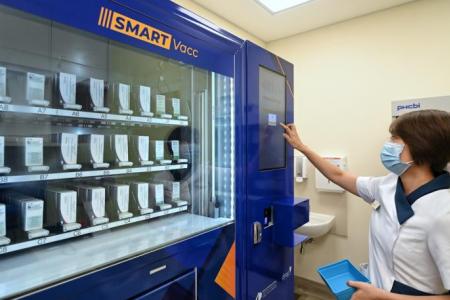New Kallang Polyclinic to pilot automated vaccine management system to ensure patient safety
Kallang residents can now access a range of healthcare services with a new polyclinic near their homes.
The Kallang Polyclinic, which shares the premises of Kwong Wai Shiu hospital at 701 Serangoon Road and is a five-minute walk from Boon Keng MRT station,expects to serve 1,000 patients a day.
Officially opened on Saturday (May 7) by Health Minister Ong Ye Kung, the polyclinic has been receiving patients since October last year.
In his opening address, Mr Ong said: "This is our 22nd polyclinic and is one of our three newest polyclinics that opened in the past year. With this latest polyclinic, we are another step closer to our target of having 32 polyclinics by 2030."
Kallang Polyclinic is also the first National Healthcare Group polyclinic to have a fully automated vaccine management system. Similar to a vending machine, it allows nurses to select from different types of vaccines for the one needed by a patient, such as a flu shot.
Once the shot is selected, the system dispenses the vaccine in less than five minutes. Nurses can cross-check if the item dispensed is correct by scanning it with an in-built image recognition feature in the system.
Previously, nurses had to open a vaccine fridge, search for what they needed, and check stocks.
The new system will save up to 45 minutes of nurses' time as it monitors and reports inventory in real time compared to the manual stock-taking of the vaccines.
The aim is to enable nurses to focus more on patient care and mitigate the risk of human error, such as administering the wrong vaccine.
Dr Valerie Teo, head of Kallang Polyclinic, said: "Now as we are heading towards digitalisation and automation, we need to innovate especially primary health care, improve our efficiency and at the same time, enhance our patient safety."
The polyclinic will also be one of the first NHG polyclinics to introduce a patient advisory council consisting of seven residents from the neighbourhood who are also patients of the clinic.
When asked why he accepted the invitation to join the council, Mr Peter Seah, 68, said: "I'm able to contribute to new initiatives for the benefits of the patients and those people using the polyclinic, and that spurred me on."
Formed last year, the council has helped to deliver solutions for patients. For instance, it helped simplify instructions for the self-help blood pressure machines in the polyclinic and recommended having a dedicated holder that patients could easily place their urine samples in, to speed up the collection process.
According to the Department of Statistics, in 2021, at least one in five residents in the Kallang planning area was 65 years old or older.
To cater to elderly patients with complex medical and social needs, the polyclinic also has the Relationship-based Health and Social Integration programme, or RELATE.
Under this programme, an elderly patient is paired with a care coach that will act as a single point of contact between the individual and their clinic healthcare team to coordinate a shared care plan.
It is not only the elderly population that the polyclinic aims to support.
Another programme providing integrated maternal and child health services seeks to identify vulnerable children under the age of three from lower-income families who need medical care and financial assistance.
Dr Karen Ng, chief clinical services, National Healthcare Group Polyclinics said: "There are also new public housing and residential developments in the area. It will also bring forth new families and usually, young families. So we see both ends of the spectrum."
Get The New Paper on your phone with the free TNP app. Download from the Apple App Store or Google Play Store now

